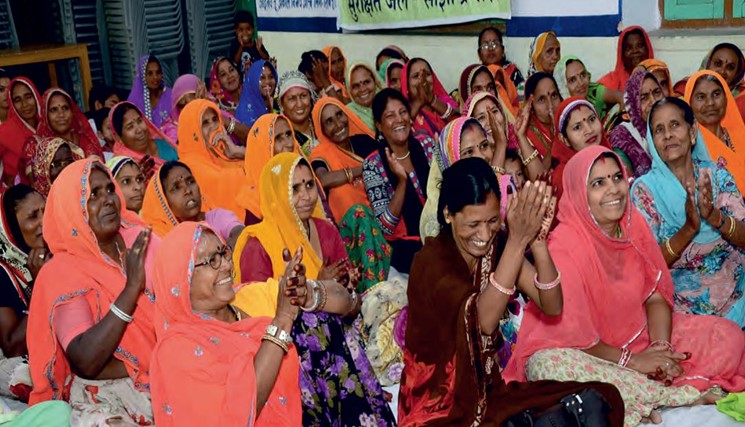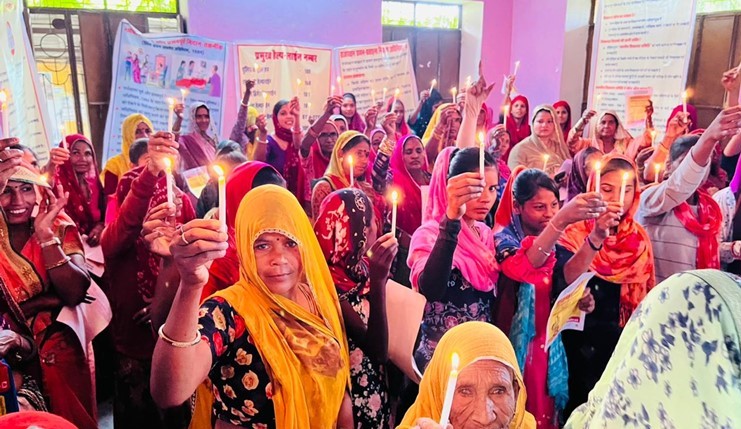NGO: Center for Advocacy and Research and Partnership for Transparency Fund, USA
The Centre for Advocacy and Research (CFAR) is a non-profit organization, founded in January 1998. It is committed to advancing the welfare of the poor and improving the quality of life of women, children, and vulnerable and marginalized groups. Its focus has been on a strong gender and development perspective given the growing influence that media was having in shaping public perceptions of gender and development.
Partnership for Transparency Fund (PTF) is a Washington, DC-based non-governmental organization founded in 1998. It supports innovative civil society organization-led and related approaches to reduce corruption, increase transparency, strengthen governance, and enhance accountability in low- and middle-income economies. PTF has supported more than 200 projects in over 50 countries.
IDRF partner since: 2019
- Focus Area: Governance and Innovation and Women’s Empowerment
- Location: Rajasthan
- Project Title: Building a Coordinated Response to Prevent and Reduce Gender-based Violence in Kishangarh Block, District Ajmer, Rajasthan
-
Details: The three-phase project in partnership with CFAR, India, and PTF, USA is a systemic and grassroots response to tackle Gender-based Violence (GBV) targeting more than 20,000 women across 33 villages in 10 Gram Panchayats in Ajmer. It aims to raise awareness about legal recourses and available services for those affected by GBV in public and at home, especially due to dowry demands and alcoholism. Phase I: Comprises a baseline survey to assess the community’s awareness of existing laws and legal recourse available for GBV cases, and government services provided to those vulnerable to, and affected by, GBV. Phase II: Establish and engage women’s forums with key stakeholders in local government. Identify eight women as change agents (Gram Sakhis or village “buddies”) and train them as paralegals to work with local government and district officials. The women will be officially recognized as Suraksha (Security) Buddies. CCTV cameras and streetlights to be installed in public spaces and help desks and helplines set up in village centers and publicized. The government has been supporting these initiatives with the SpeakUp app for mobile phones to provide immediate access to police, women’s forums, and families. The project attracted wider attention when the Hindustan Times, a leading national newspaper, carried an article highlighting its success in July 2023. Phase III: CFAR, IDRF, and PTF are keen to upscale this success by replicating it in the 21 other gram panchayats in Kishangarh Block. Main Highlights of the Program: Continued success and relevance in targeted communities: Educating the community about GBV, its consequences, legal recourses, and available support services for survivors like healthcare, livelihood opportunities, etc. Impact • Transformative impact on survivors, enabling rebuilding lives. • Shifting societal attitudes and creating safer environments for women • Strengthening community-based models and enhancing govt. schemes. Multi-faced approaches adopted: Women’s forums, gender resource, and counseling centers, paralegal training to (Gram Sakhis) community members, legal aid, door-to-door awareness campaigns, coordination between departments, strengthening police initiatives, enhancing, frontline workers’ training, adopting village micro plans (streetlights, cc cameras, etc.), sensitizing boys and men, helpline, etc. are helping towards improvement and effectiveness of the project. Empowering Women Against Violence in Public and at Home: Improving access to essential services and livelihood options in the fight against GBV: Access to financial resources and opportunities is aimed at promoting gender equality within the community. Economic independence strengthens women’s ability to challenge traditional gender norms, assert boundaries, and demand accountability from perpetrators. This will lead to long-term empowerment and social change and act as a catalyst for advancing gender equality. An excellent example: Annapurna Indira Rasoi It is essential to address the immediate needs of vulnerable individuals and the underlying economic factors contributing to GBV. Annapurna Indira Rasoi (kitchen) creates immediate livelihood opportunities for victims, employing them as cooks, kitchen staff, or administrators within the community kitchens. “Before, I felt isolated and helpless...now I have access to support like healthcare, counseling, and legal aid. These have helped me heal and rebuild my life. I am grateful for your support during my moment of crisis”, says a domestic violence survivor.
More details: https://cfar.org.in/gender-based-violence/












